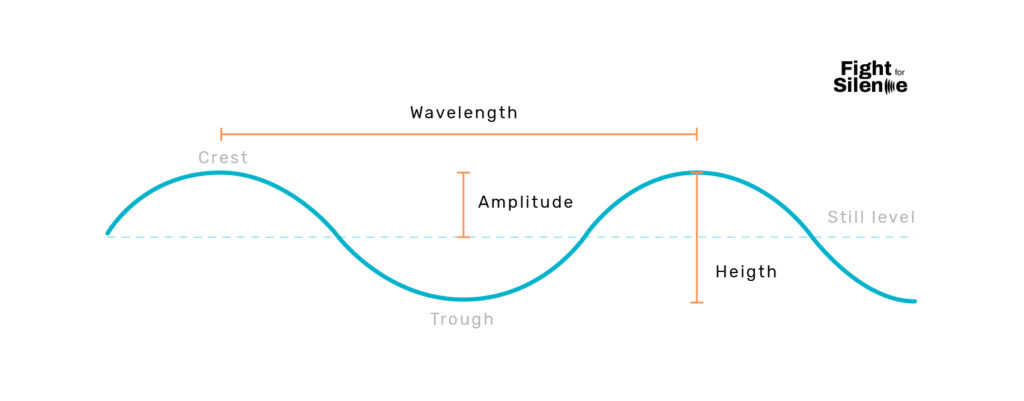
The difference between music, sound, and noise
You’re sitting at home trying to enjoy a movie or new show, but all the dialogue keeps getting lost behind your noisy neighbors being just loud enough to get annoying. It’s a common experience.
You march over to their apartment to ask them to turn their noise down, fully ready to start a scene, when their response takes you completely off guard; they don’t know what noise you are talking about, they’re just listening to the latest single of their favorite group!
While you ask them to be more considerate of their surroundings, questions start popping up in your head. What makes a sound a noise? What makes a sound be considered music? What’s the difference between music and noise? and why does it seem like the line between them can be so thin?
What makes a sound a sound?
To begin our discussion of sound, music and noise, we first need to establish what a sound is. A sound is a vibration of some medium, usually air, at a certain frequency which correlates to the pitch of the sound.

Speech, for example, is sound caused by our vocal cords vibrating the air at certain frequencies, which can then be picked up by the ears of another person. These vibrations move as a wave through the air, and can even move from one medium to another, from air to concrete for example.
What makes sound music?
Music is a combination of sounds, but not any sounds. In music, there are certain elements of sound that we tend to expect. Rhythm is perhaps the biggest; music almost always plays off of some consistent rhythm. Anyone who has enjoyed a good drum beat can tell you that even a simple sound played in a rhythmic way can easily sound pleasant and musical, regardless of any other factors.
Pitch and harmony also play a massive role in the perception of music. Different pitches have different connotations, especially when strung together into longer cords (more on this later).
Several layers of instruments played together, to form melodies and harmonies, also tend to sound naturally musical, and like rhythm can do so regardless of what else is present. A pair of monotones played together to form a cord can sound naturally musical regardless of whether there is more sound present.

So what’s the common theme between these elements? What makes things like rhythm and harmony special? There are plenty of lines of thought here, ranging from old social instincts to cultural biases, but the most comprehensive of these is intent. Music sounds like music when it’s made with some amount of intention behind it. So what happens when you have sound with no intention behind it?
What makes a sound a noise?
The definition of noise is contrastingly very simple and very complex. In simple terms, noise is any sound that isn’t wanted in the current situation.
Are your neighbors playing music too loud, so you can’t hear your TV? That would be considered noise.
Is there a loud motorbike outside, interrupting a recording you’re trying to do? That would also be considered noise.
It’s only when you’re purposefully creating a noise, as in the musical examples above, that sound is no longer considered noise.
Which brings up an interesting conundrum; what if sound that is intentionally created by one person isn’t wanted by another person? Consider the neighbor example, where one person is enjoying some music to the ire of another person. To the neighbor, that music is intentional, but to the person just trying to enjoy their show that music is unwanted, and considered noise. So in cases like these, how the sound is defined is entirely down to who you ask.
Cultural differences in music
We’ve discussed how the difference between music and noise relies mostly on intent, meaning that as long as a person is purposefully making music, most will agree that it’s music rather than just noise, right? Well not quite, there are still some very major differences between what is considered good music to different people.
Even aside from personal choices like favorite genres, studies show that some fundamentals of music theory can be very different depending on where you’re from. Most western cultures tend to prefer major keys in their music, as it tends to sound happy and pleasant, but some cultures prefer minor keys, and there are even some that don’t have the concept of key signatures.
What this means is that music from different cultures, even if played with intentions, can sound like noise to someone of a different culture; an American listening to the chanting of Amazonian tribesmen, whose culture prefers minor keys, would think that it’s just out of tune caterwauling.
The evolution of music over time
But it’s not only from one culture to another that the perception of what’s noise and what’s music can change. Even within the same culture, some people might not see eye to eye on this.
One of the possible explanations for this is that our perfection of what makes sound music also changed over time, and still continues to do so today.
What was considered good music in the 18th century can be hard for a modern teenager to appreciate, the same way older generations don’t seem to understand how the young can appreciate the artists and songs that they do.
The video below will take you through a couple millennia of popular songs in just 13 minutes. It’s worth watching.
Conclusion
It can sometimes be hard to keep different perspectives in mind. When your noisy neighbor is interrupting the show you’ve waited all day to watch, it can be easy to lose patience. But remember that things like this come down to perception, and what to you is just noisy interference can be much more important to someone else. And similarly, what’s important to you could just be empty noise to someone else.
These differences are probably more obvious today than ever before, since our world becomes more and more global, and information can now cross the globe in just a fraction of a second.
If you find yourself in uncomfortable situations involving sound/music/noise, try to meet in the middle, talk things out, and many times you’ll find that at least somewhere you’ll have some common ground.

[…] Simply put, the impact of noise on our bodies cannot be defined solely by its loudness or perceived annoyance. Exposure to high levels of noise pollution can lead to various health issues, including stress, sleep disturbance, and hearing damage, regardless of whether the sound is bothersome. […]